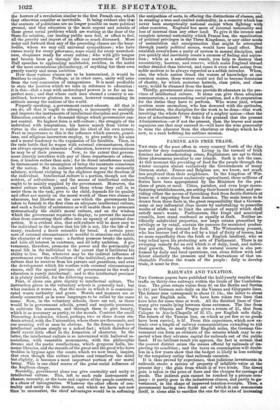FAMINE AND FREE TRADE.
THE state of the poor ofers in every country North of the Alps matter for deep consideration. Living in the turmoil of Irish famines and manufacturing crises, Englishmen are apt to think those ph zenomena peculiar to our islands. Such is not the case. At this moment the providing of food for the people through the winter occupies almost exclusively the Governments of many German states. France and Belgium are, we know, not much less perplexed than their neighbours. In the kingdom of Wir- temberg,, a state almost exclusively agricultural, three millions of florins have been appropriated bythe Ministers for the pur- chase of grain or meal. Cities, parishes, and even large manu- facturing establishments, are setting their houses in order, and pro- ' viding either the means of furnishing food from fertile districts at. home or of importing flour from America. The main lesson to be drawn from these facts is, the great responsibility that a Govern- ment or any influential class incurs by undertaking to prescribe modes of truffle and to limit the amount of supply which shall satisfy men's wants. Parliaments, like kings and municipal councils, here stand confessed as equally at fault. Neither ar- tificially subdivided properties, nor large estates prescribed by privilege or by entail, contain the panacea for restricted produc- tion and growing demand for food. The Wirtemberg peasant, who has become lord of the soil by a kind of fixity of tenure, has no more superfluity than the Irish or English landlord, who so long relied upon his protecting acts of Parliament. There is no sweeping remedy for an evil which is of daily, local, and indivi- dual growth. Trade, which in its natural course is also per- formed by daily and local operations, can alone follow with suf- ficient elasticity the pressure and the fluctuations of that un- chainable Proteus the wants of the people : fully to develop trade, it must be free.


























 Previous page
Previous page